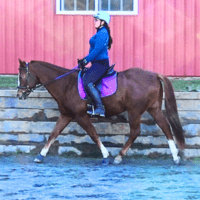It is very beneficial and I think it is important that BEFORE you start working with, riding or training horses you understand the horse’s basic psychology. Then you will have a better idea of what it’s like being a horse and why they do what they do.
Though I am just going to be covering the basics and you probably won’t remember everything, the information you utilize from this will help you become;
- more aware and safer working around horses,
- communicate more clearly with horses,
- have a higher level of empathy for the horses you work with.
You will have a better understanding of the horse’s perspective and actions.
It takes years of study and working with horses to get the horse sense of an experienced Horseperson. This is also called being Horse Savvy. So this short series is just the beginning of your journey with horses.
If you have been working with horses and or riding for a while, it is still useful for you to read over this insight into the mind and behavior of horses.
Maybe you haven’t actually learned much about horse psychology or maybe you could use a review. This will only improve your interactions with the horses you ride and work with, and help you have more empathy because you will better understand or be reminded of why your horse may be acting a certain way.
Sometimes horses are mistaken for having bad behavior when really it’s just the horse reacting, trying to communicate something, or doing what they think is the easiest thing to do, to solve their problem.
So in this series, I am going to cover several topics regarding the psychology and behavior of horses.
- Horses As A Prey Animal
- Horses As A Herd Animal
- Horses’ Natural Instincts
- Horse Communication & Body Language
Although this is not typically a prerequisite to riding lessons or working with horses, I really think it’s worth taking the time to learn because you are working with a living breathing animal, not a bike, vehicle, or machine.
This animal has a mind of their own, feelings, likes, and dislikes. And at the very least you should know the basics of how a horse behaves and some of the whys. They are not big puppies contrary to what some people think of how they act.
They have their own unique set of instincts and traits.
Now that you have an idea of the importance of knowing the mind of a horse before you start working with and riding them, in the next post I will first be going over horses as a prey animals. What a prey animal is and the traits horses have that make them a prey animal.
I will try to give the basic information you need in the following posts and try to keep them short and sweet and to the point.
Posts In This Series
- Understanding Horse Behavior Before You Work With Horses: Equine Psychology Mini Series | Part 1 Intro
- Horses As Prey Animals: Equine Psychology Mini Series | Part 2
- Horses As Herd Animals: Equine Psychology Mini Series | Part 3
- Horse Instincts: Equine Psychology Mini-Series | Part 4
- Horse Communication 101: Equine Psychology Series Part 5
If you have further questions about the topics send me an email to [email protected]. I may add your questions to the post if they would be of help to others.
Cheers, Kacey

